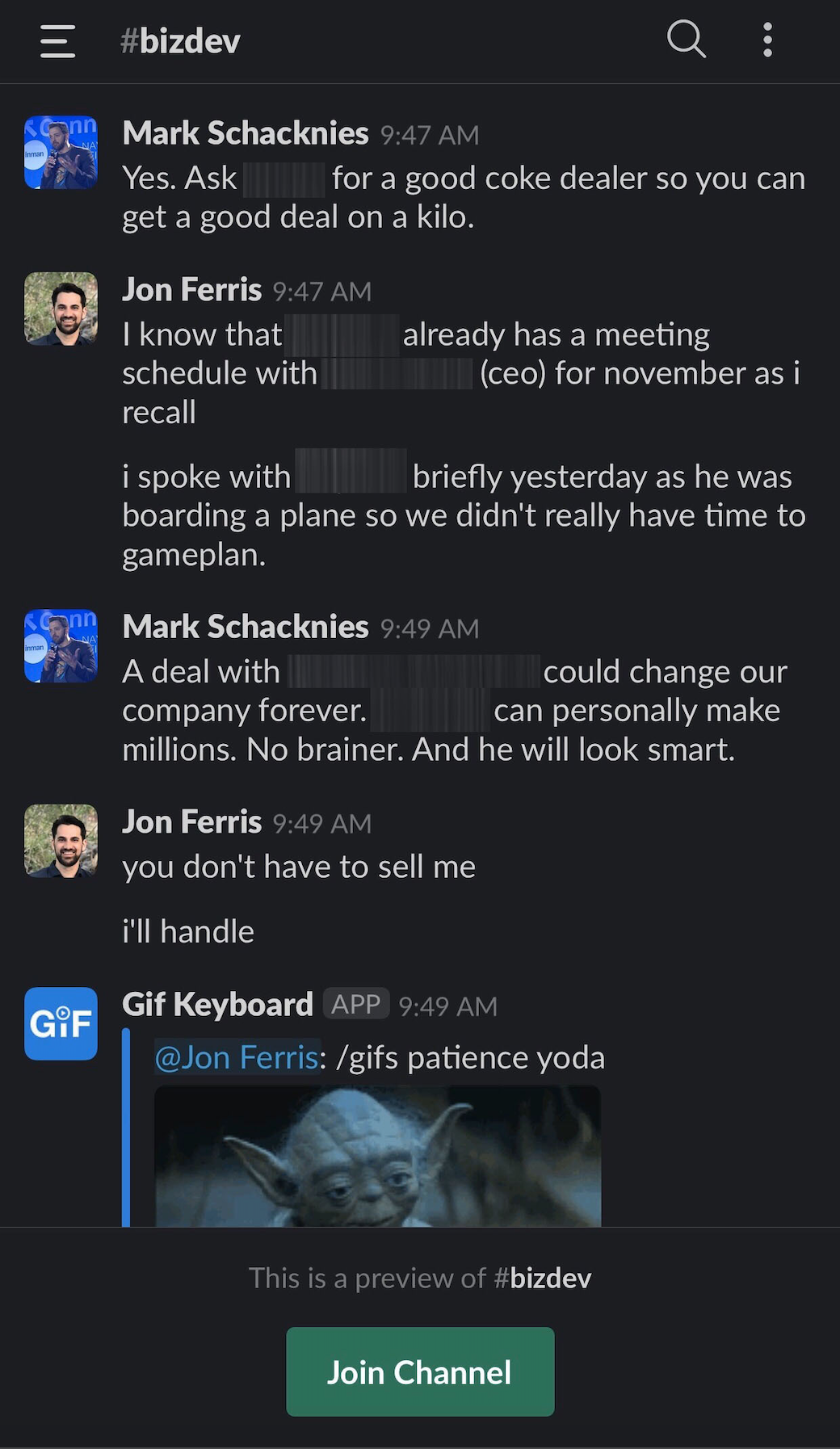This story has been updated with comment from a July 21 post from Remine CEO Mark Schacknies on the Remine company blog.
Last year, Remine CEO Mark Schacknies went to lunch at a health food restaurant in Arlington, Virginia, received what he described as “terrible service,” and promptly ordered a manager to fire the waiter serving him.
The restaurant, True Food Kitchen, at the Ballston Quarter mall, served as a frequent lunch spot for Schacknies and fellow Remine co-founder and COO Jonathan Spinetto near the software company’s headquarters in Vienna, Virginia. Shortly after his lunch that day, Schacknies shared the story with Spinetto on a company Slack channel, adding a GIF of Marlon Brando as Vito Corleone from The Godfather.
“I must fire one person per week to live,” Schacknies wrote in the channel, which was publicly viewable to employees of the company. “It’s my fuel.”

If the message carried the whiff of an empty boast or tasteless joke, it also paralleled a grim reality at Remine, where, over the past 16 months, the company’s personnel rolls have plunged from 185 employees, about 100 of them software engineers, to about 68 employees, of which about three dozen are software engineers. Two-thirds of those losses came from two mass layoffs in March 2019 and 2020, including one that gutted the company’s sales team.

Mark Schacknies
Along the way, former Remine employees told Inman, Schacknies, Spinetto and other executives ruled over a workplace environment with overworked engineers, flagging morale and embarrassing Slack behavior from executives.
Public conversations on the company’s Slack forum between Schacknies, 43, Spinetto, 36, and at least one other executive, including explicit references to “dick pics,” “boners” and “cocaine,” merely underscored the company’s vast array of problems, the former employees recalled.
“One of the most unprofessional environments I’ve been a part of,” said Frank* (*names marked with asterisks have been changed to protect anonymity), one of eight former Remine employees who spoke to Inman on the condition of anonymity due to signed separation agreements with non-disparagement clauses or fears of retribution. “As far as the way they conduct themselves, it’s more fratty rather than ‘Hey, I’m a CEO of a company and I should run it like I’m a CEO of a company.'”
Remine responded to a comprehensive request for comment sent on June 15 only through its legal counsel. A little more than a week later, the company filed suit in Virginia state court against unnamed current and former company employees for violation of confidentiality agreements.
UPDATE: In a blog post published July 21, Schacknies wrote, “A few days ago, the real estate industry blog, Inman, posted an article about the culture at Remine. The article included screenshots of a Slack conversation (online chat) from about a year ago between two other male Remine executives and me.
“The conversation was in poor taste, highly inappropriate and we apologize.
“Joking or not, the language we used was unacceptable in any professional context, even a supposedly private one. That said, we want to assure our employees, customers, partners, and friends that we were, in fact, joking.”
Schacknies added that he and other members of the executive team will undergo “advanced sensitivity training.”
A rocky year

Jonathan Spinetto
Remine launched under the name “Real Deal” at a November 2015 hackathon hosted by Zillow Group, winning runner-up for “best use of public records data.” A month later, the company incorporated as Remine LLC, later Remine Inc. Former real estate agents Schacknies and Spinetto, as well as Remine president Leo Pareja, along with Daniel Huertas and Jad Meouchy, are the company’s co-founders.
Remine began by offering predictive data analytics subscriptions to individual real estate agents, but pivoted last year to creating products for multiple listing services and signing them up on multi-year contracts. The company’s partners include more than 50 multiple listing services representing more than 1 million agent, broker and appraiser subscribers in the U.S. and Canada.
In February 2019, the company raised $30 million in a Series A round of financing at a post-money valuation that private capital market research firm PitchBook put at $120.7 million. Nonetheless, the company laid off 42 members of its sales staff a month after announcing the round and made co-founder and chief financial officer Schacknies the new CEO, transitioning then-CEO Pareja to president.
In October 2019, the company pulled an agent-matching feature after blogger and software entrepreneur Greg Robertson voiced concerns about the company’s display of MLS data. This past February, a security blunder left Remine’s system open to hacking, potentially exposing private agent and consumer information. (Disclosure: Robertson has been an occasional unpaid Inman contributor and his company, W+R Studios, advertises with Inman.)
On March 9, the company laid off 38 employees. Approximately 40 other employees have also left, including Sina Iman, senior director of engineering; Andrew Sheh, chief technology officer; Won Yoo, vice president of development; Riley Slitor, vice president of people; Jeff Lord, executive vice president and general counsel; Rikki Williams, vice president of finance; Bill Andrews, director of MLS and industry relations; and Quinn Nichols, vice president of marketing and communications.
Sheh, Yoo and Slitor did not respond to requests for comment. In response to LinkedIn messages sent by Inman, Lord and Williams declined to comment. Nichols and Andrews told Inman they had resigned but declined to comment further. Andrews said he’d been working from home “from day one” at Remine and “out of the loop on any day-to-day business.”
More recently, a term sheet obtained by Inman and confirmed as authentic by Remine revealed the company raised a Series B round on terms that indicate the company’s valuation has plunged by about two-thirds. The round handed majority control of Remine’s board of directors from its founders to its biggest investors, New York-based growth equity firm Stripes LLC and Canada-based boutique investment firm Ayrshire Real Estate Technologies LP.
Remine investors Stripes, Ayrshire and Moody’s did not respond to multiple emailed requests for comment for this story. Remine board members Ron Shah of Stripes and Phil Swift of Ayrshire also did not respond to requests for comment sent to their LinkedIn accounts.
Real estate coach Tom Ferry, a Remine investor, said he owns less than one-hundredth of 1 percent of the company and “was horrified” by screenshots and allegations of inappropriate behavior by Remine executives, which he said he was not aware of. He said he doesn’t know any of the existing management except Pareja.
“Hopefully if all of that is true they get it corrected very quickly because no one should work in an environment like that,” Ferry said.
“You read that kind of stuff and it kind of breaks your heart,” he added.
The screenshots: ‘How stupid can you be?’
A series of screenshots of Slack conversations between Schacknies and other executives seemed to reverberate across the company.

Jon Ferris
The screenshots appear to date from April 2019 to November 2019. They came from a Slack channel called #bizdev that only three people in the company used: Schacknies, Spinetto and Remine vice president of business development and partnerships Jon Ferris. The channel was public, meaning anyone in the company could see it, but the three people in it didn’t seem to know that.
Last fall, what was left of the sales team began circulating screenshots of what the three executives talked about when they thought no one was looking. Because of sensitive content, Inman has blurred some names in the screenshots when we could confirm those named were peripheral to Remine and its operations.
In the screenshots, Schacknies, Spinetto and Ferris discussed “boners” and putting a “dick pic” on a business card for the annual Mortgage Bankers Association conference in October. Schacknies suggested Ferris “get a bs card that sayd [sic] VP, Mortgage Partnerships… or something to give them boners” and to “put a dick pic on the back so its [sic] memorable.” Spinetto added, “#truth” and Ferris replied,” “Prob going to need an 8.5 x 11 for my dick pic.”


The three also referenced cocaine use in some Slack messages.


Is anyone actually on drugs at Remine?
“I have no idea,” Frank said. “My guess is that they are probably joking, but I don’t know.”
The screenshots shocked and disappointed those who saw them or heard about them in departments across the company.

Leo Pareja
“The general reaction to this was, ‘How stupid can you be?'” Frank said.
Multiple former employees described the makeup of the Remine staff as overwhelmingly male. Other Remine employees told Inman that although the executives seemed to conform to a “bro-ey” stereotype, at the office they did not use anything like the type of language displayed in the screenshots.
“Most of them were pretty professional in the office,” Luke*, a software engineer, said.
In the Slack screenshots, the executives made clear what they think of criticism from industry incumbents. The screenshot below appears to refer to an Oct. 7, 2019 post titled “Remine sticks its neck out” on Robertson’s blog Vendor Alley.
“[H]e puts out troll bait and the 5th year seniors talk shit and we are the bad guy?” Ferris wrote.
“[T]his guy needs to get shut up,” Ferris added.

Screenshot from Remine #bizdev Slack channel
9/30: ‘A massive crunch’
Remine has not shied away from extolling its ambitions. An investor pitch deck dating from late 2017 or early 2018 declared Remine’s desire to “Make MLS Great Again!” and asserted, “There has been ZERO innovation in this forgotten, and misunderstood space for over 10 years!”
“Our MLS strategy is akin to a fertilized egg analogy,” the pitch continued, accentuated with an image of sperm swimming toward an egg. “Once you are in, you are in. MLS is a winner take all sport. And its [sic] hard for other entrants.”
According to former employees that Inman spoke with, Remine promoted what Paul*, a former Remine software engineer, referred to as “overwork culture.” Keith*, a former employee in operations, said the culture was “terrible,” in large part because of what at least some employees saw as the expectation to work non-stop.
“I was expected to be on call around the clock even on holidays,” Keith said. Keith was later fired and told it “wasn’t a good fit.”
The company’s ambition climaxed during the third quarter of 2019 in a period some employees referred to by its deadline: “9/30.” Remine gave its software developers until September 30 to either re-launch or create several new features and products in order to launch its MLS 2.0 platform. There were so many that none of the employees Inman spoke to could list all of them, though an advanced search feature, an integration with Equifax and a consumer site and app were among them.
“There was a massive crunch imposed on the majority of the devs… Forced the devs to work 16-plus hour days each day, each week for I think it was around 3 months, maybe more. Broke a lot of the devs in a mental sense. No reward given after,” Frank said.
Evan*, a former Remine software engineer, recalled the late nights. “I remember I set alarms to get up at four in the morning to run jobs to get stuff out in time. One of my coworkers … was up until 2 or 3 a.m. every night. It was unbelievable.”
Although former employees say Andrew Sheh, Remine’s chief technology officer, tried to serve as a protective barrier from Schacknies and Spinetto when they made what employees described as unreasonable or unnecessary demands, he was not always successful.
Remine announced the launch of its MLS 2.0 platform on Oct. 2. Evan remembered Schacknies and Spinetto reacted with exasperation when not all of the features were ready on time.
Luke recalls 9/30 as a “disaster;” Paul as a “shit show.” Other sources noted that not all teams were part of the 9/30 crunch.
Remine told Inman through its lawyers that “most or all of former employees’ assertions related to the so-called ‘9/30’ project are false,” but would not elaborate further.
Shedding engineers
In December 2019, Remine’s engineering team started bleeding leaders. The company fired Sina Iman, the company’s senior director of engineering at its Irvine, California, office after a video surfaced of Iman being arrested after acting out at a Washington, D.C. strip club, the Camelot Showbar, the day after Thanksgiving.
In the video, Iman, who appears intoxicated, uses language such as “retard,” “pussy,” and “little bitch,” and, according to Iman, calls out to club managers “Nick or Joe.” A police report of the incident said Iman, his brother and a woman had been drinking inside the strip club for several hours when, upon being presented with the bill, Iman “became irate and started throwing glasses, bottles and chairs.” He then went outside and threw a sandwich board at a vehicle.
The video appears to have been uploaded by the owner of the vehicle, according to the Instagram post. The Instagram account appears to have been created for the sole purpose of posting the video; it includes only the one post and has one follower.
Iman completed community service for the incident and paid $250 in restitution to the victim, according to public records. In an email to Inman, Iman emphasized that he was not criminally charged for what he did inside the strip club, but rather for throwing a plastic sign at a car, which resulted in two counts of misdemeanor property destruction. He declined to comment further.
Sheh, Remine’s chief technology officer for nearly three years, left Remine in the first half of February of this year. Remine staff were told he left because he was burned out and not spending enough time with his wife and toddler. Remine hired a vice president of development, Won Yoo, around that time.
Yoo lasted less than a month. He quit Feb. 24, the day Remine discovered a security blunder that had left its system open to hacking and a couple of weeks before the March 9 layoff. Former employees said Yoo did not leave because of the security blunder, but rather because process improvements he suggested weren’t being adopted.
Sheh and Yoo did not respond to requests for comment on LinkedIn.
According to an org chart of the engineering team obtained by Inman, there were 92 people on the team around October 2019. Since then, according to LinkedIn and interviews with former employees, at least 54 have left Remine, 33 are still there and the status of five is unclear.
*Names have been changed to protect anonymity.
Email Andrea V. Brambila.
Like me on Facebook | Follow me on Twitter

























